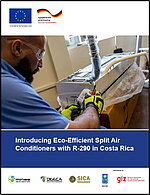Highlighting inventories and standards in cooling sector

GIZ Proklima presented a new standards paper with an overview and orientation on international safety standards for ACR&HP systems.
Between 11 and 14 July the 40th Open-ended Working Group of the Parties to the Montreal Protocol on Substances that Deplete the Ozone Layer met in Vienna. The parties to the Montreal Protocol gather twice a year to monitor and identify barriers to and take decisions regarding the implementation of this environmental treaty. In Vienna, a particular focus was put on the topic of energy efficiency opportunities when phasing down hydrofluorocarbons (HFCs). A two-days workshop showcased market trends, policy recommendations as well technology potential to enable the parties to support more energy efficient cooling appliances with lower global warming potential refrigerants.
Effective January 1, 2019, the Kigali Amendment to the Montreal Protocol marks the beginning of the phasing-out of climate-damaging refrigerants such as hydrofluorocarbons (HFCs). Yet monitoring the greenhouse gas emissions caused by these substances through storage, consumption and destruction remains a far from standardized process and many countries lack the experience to ensure effective and correct inventories.
In response to this challenge, the project “GIZ Proklima” presented during a side event effective approaches to emission tracking in the refrigeration and air conditioning (RAC) sector and demonstrated a specially developed emissions reporting tool that facilitates the countries' reporting of their HFCs emissions to the United Nations Framework Convention on Climate Change (UNFCCC).
 Countries are facing several challenges when collecting data. For example, collecting data can be intensive and requires personnel or consultants locally. Additionally statistics data often do not contain the technical parameters needed. However, proper collecting and reporting opens opportunities, such as support in policy design, implementation, and evaluation. All three countries, Kenya, Tunisia, and Vietnam, presenting their experiences pointed out that the collected data can help creating potential mitigation measures to contribute to the Nationally Determined Contributions (NDCs).
Countries are facing several challenges when collecting data. For example, collecting data can be intensive and requires personnel or consultants locally. Additionally statistics data often do not contain the technical parameters needed. However, proper collecting and reporting opens opportunities, such as support in policy design, implementation, and evaluation. All three countries, Kenya, Tunisia, and Vietnam, presenting their experiences pointed out that the collected data can help creating potential mitigation measures to contribute to the Nationally Determined Contributions (NDCs).
This event was organized by the projects “Cool Contributions fighting climate change” as well as “Management and Destruction of ozone depleting substances in ODS banks”, both financed by the International Climate Initiative (IKI) of the German Federal Ministry for the Environment, Nature Conservation and Nuclear Safety (BMU) and implemented by the Deutsche Gesellschaft für Internationale Zusammenarbeit (GIZ) GmbH.
The second side event – co-hosted with the environmental investigation agency (EIA) - discussed the issue of the climate imperative of modernizing safety standards for successful implementation of the Kigali Amendment and the ongoing hydrochlorofluorocarbon (HCFC) phase-out. It highlighted several points necessary to create smarter standards. Amongst others, these include inter alia timely and coordinated structures, increased transparency and broad stakeholder participation, comprehensive synchronous examination of all alternatives, and sufficient resources for technical experts.
The process of improving safety standards is complex, but very important. Recognizing these circumstances, GIZ Proklima presented a new standards paper that intends to provide policymakers, standard authorities and private sector representatives with an overview and orientation on international safety standards for Air Conditioning, Refrigeration & Heat Pump (ACR&HP) systems, in particular addressing developing countries that intend to widen the use of environmentally friendly refrigerants in a safe way.
 The document identifies what is currently feasible with existing safety standard requirements, and what possibilities exist to ease the barriers and improve safety standards for the future. In particular, it addresses the key safety standards applicable to ACR&HP systems; how those safety standards can be applied; technical obligations arising from the various safety standards and finally options and opportunities to improve safety standards internationally and/or nationally.
The document identifies what is currently feasible with existing safety standard requirements, and what possibilities exist to ease the barriers and improve safety standards for the future. In particular, it addresses the key safety standards applicable to ACR&HP systems; how those safety standards can be applied; technical obligations arising from the various safety standards and finally options and opportunities to improve safety standards internationally and/or nationally.
The publication “International Safety Standards in Air Conditioning, Refrigeration & Heat Pump” (PDF, 5,9 MB, English) paper has been drafted under the Green Cooling Initiative (GCI), which is financed by IKI of the BMU.
The link has been copied to the clipboard
Contact
IKI Office
Zukunft – Umwelt – Gesellschaft (ZUG) gGmbH
Stresemannstraße 69-71
10963 Berlin












